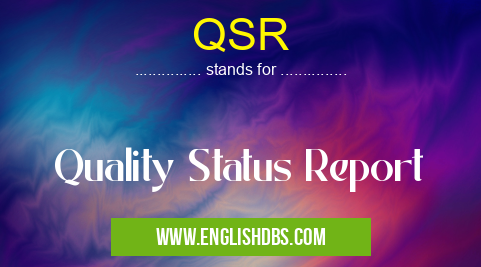What does QSR mean in UNCLASSIFIED
QSR stands for Quality Status Report. It is a comprehensive document that outlines the quality of a product, service, or process. QSRs are used to assess the current state of quality, identify areas for improvement, and track progress over time.

QSR meaning in Unclassified in Miscellaneous
QSR mostly used in an acronym Unclassified in Category Miscellaneous that means Quality Status Report
Shorthand: QSR,
Full Form: Quality Status Report
For more information of "Quality Status Report", see the section below.
What does QSR Stand for?
- Quality Status Report
QSR Meaning
QSRs provide a comprehensive overview of quality-related data, including:
- Product or service performance: QSRs track key performance indicators (KPIs) to measure the quality of products or services.
- Process efficiency: QSRs examine the efficiency of processes and identify areas for optimization.
- Customer feedback: QSRs gather customer feedback to understand their experiences and identify areas for improvement.
- Compliance: QSRs ensure compliance with quality standards and regulations.
Importance of QSRs
QSRs play a crucial role in:
- Monitoring quality: QSRs provide regular updates on the quality of products, services, or processes.
- Identifying areas for improvement: QSRs help organizations pinpoint weaknesses and areas where improvements can be made.
- Tracking progress: QSRs track progress over time, enabling organizations to measure the effectiveness of their quality initiatives.
- Making informed decisions: QSRs provide data-driven insights that support informed decision-making about quality-related matters.
Essential Questions and Answers on Quality Status Report in "MISCELLANEOUS»UNFILED"
What is a Quality Status Report (QSR)?
A Quality Status Report (QSR) is a document that provides an overview of the quality of a product or service. It typically includes information on the product's or service's performance, any defects or issues that have been identified, and any corrective actions that have been taken.
What is the purpose of a QSR?
The purpose of a QSR is to provide stakeholders with a clear and concise overview of the quality of a product or service. This information can be used to make decisions about the product or service, such as whether to continue using it, invest in it, or improve it.
Who should write a QSR?
A QSR should be written by someone who is knowledgeable about the product or service and who has access to the necessary data. This may include the product manager, the quality manager, or a technical expert.
What should be included in a QSR?
A QSR should typically include the following information:
- An overview of the product or service
- A summary of the product's or service's performance
- A list of any defects or issues that have been identified
- A description of any corrective actions that have been taken
- A forecast of future quality expectations
How often should a QSR be updated?
The frequency with which a QSR should be updated depends on the product or service and the level of risk associated with it. High-risk products or services should be updated more frequently than low-risk products or services.
Final Words: QSRs are essential tools for organizations seeking to improve and maintain the quality of their products, services, and processes. By providing comprehensive data and insights, QSRs enable organizations to make informed decisions and drive continuous improvement efforts.
